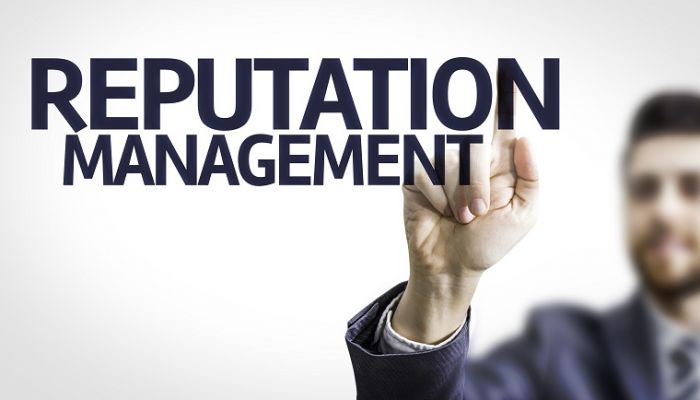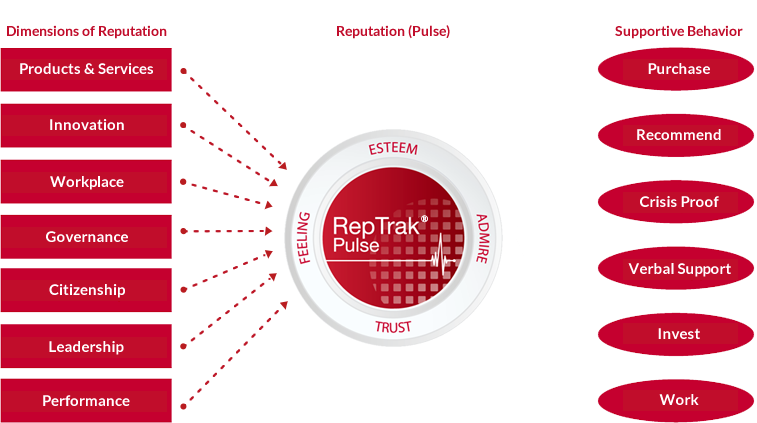Improve and maintain corporate reputation
Businesses and organisations are acutely aware more than ever of the importance of protecting their reputation. Some have learned the hard way when crisis situations have hit and they haven’t been prepared or have handled it badly.
There are three sides to reputation management – the first is maintaining reputation when it’s at its highest, the second is developing a good reputation from a new-start perspective and the third is managing reputation and then changing perceptions in a crisis situation.
When conducting studies, the Reputation Institute, the global reputation-based research and advisory firm, uses its RepTrak® measurement framework and measures the perceptions and opinions on:
- products or services
- innovation
- workplace
- corporate governance
- public and social impact
- leadership
- performance
Reputation can make or break businesses. You can use the above to help with your strategy and management.
Companies or organisations with reputation issues are more likely to feel the wrath of the law and importantly, the public. Nowadays, it may also provoke a cyber attack.
So, how can corporate reputation be improved or maintained when there are so many different elements to consider?
Firstly, it all comes back to the organisational values and objectives. If the values of the organisation are real, ethical and trustworthy, then they should be embedded in every element of organisational work.
Business and organisation have a duty to their shareholders, stakeholders, employees, suppliers and the public, not to mention regulators. You will be held to account.
Public trust is paramount. In the 2008 crash, public trust was at an all-time low in the financial industry, with the public being wary and confused, financially worse off and the impact on the global economy at its worst.
Today’s challenge in reputation management is not only speed but also given the change in landscape, there is media, social media, influencers in their many forms and we must ensure our risk assessments, scenario planning and crisis comms plans are fit for purpose today.
I’m not talking about lying. I’m not talking about coming up with cover-up stories, I’m talking about genuine, ethical business practice. Understanding the business, the scenarios, the likelihood and the potential impacts, will help you understand what you’d need to do, over the short, medium and long-term, to protect reputation.
Actions speak louder than words
You can say whatever you like, but if your actions don’t back this up, then your words are worth nothing and will no doubt be even more detrimental to your reputation.
In addition, the under-rated skill of listening is key. Listening to the people who impact on your business. Listening will help greater understanding and greater understanding leads to better-informed decisions and strategies.
Listening will also help build better relationships as people recognise you are taking their opinions, views and also experiences into consideration. This, in turn will also add greater value to the business and the influence gained will be beneficial.
Listening tools also exist and can be used online, monitoring and listening to different communities. This is essential to keep on top of any issues which may be arising and also in case there are any other groups or communities who you may not even have been aware of. It always an opportunity to respond to issues before they may turn to a crisis.
Top down, bottom up
As we know, communication works both ways, as does respect and understanding. CEOs and boards have a duty to act as leaders. Leaders should want insights, understand and listen. It shouldn’t just be something for management. Leaders should set an example.
CEOs have the opportunity to really put their money where their mouth is and strengthen corporate reputation by distinguishing themselves and setting a moral, ethical and world-leading standard – no matter how big or small the business or organisation may be.
Charged up CEOs can really set an example and inspire others, too.
Cyber threats
Interestingly, people find it curious that PR people should be involved or be keen to know systems and protocols in IT departments.
At #PRFest in June, I’ve worked with Craig McGill at PwC to bring their Game of Threats cyber attack simulator to the festival. One of the biggest organisational risks is unhappy employees or those who don’t understand the potential impacts of bad practice.
Take someone using an unknown USB in company IT equipment which could contain malware or unhappy employees spreading negative stories about the company. You are more likely to be targeted if you’re deemed an unethical business or an organisation with an already poor reputation.
It’s so important PR and comms people are on top of recognising issues and impacts and including this within their plans, including simulating scenarios.
Act before a crisis hits
With tools, systems and people to recognise issues as they start, the key is to address them before a crisis hits. This involves insights and data, planning, scenario tests, and regular monitoring to ensure the plan is always fit for business purposes.
Every member of staff at every level has a part to play. Managers are more likely to spot issues further down the chain than say, a CEO would. But do they know how to report or deal with it to ensure it’s handled effectively? This leads to thorough internal communications functions, policies and management.
Systems and processes
An early warning system using the risk assessments and listening/monitoring tools will play a vital role in any issues or crisis situation. It’s the reporting of a potential issue that is vital – quickly. Without denial.
- Insights and data –internal and external – listening and monitoring
- Understand what this information is telling you. Also understand what matters to your stakeholders. What do the actions look like that support what you’d be saying?
- Wider and transparent conversations. Think of collaborations and partnerships as an opportunity to involved a bigger set of stakeholders and by collaborating or partnering, there is a two-way approach.
Six areas for corporate reputation to monitor and manage
- Operating and business performance
- Legal or ethical
- Personnel – particularly misconduct
- Political
- Environmental
- Safety and security
Confidence in you and your business
The importance of confidence in crisis preparation must be underlined. Knowing that you and your business are prepared to face ‘the unknown’ instils confidence. Feeling, being and acting confident are essential groundings for facing unforeseen and emotionally difficult crisis events at a time when you must reassure others that the situation is under control and being handled properly.
The ability to anticipate trouble before it happens is the best source of confidence. Your reputation is your biggest asset. It must be protected.
[testimonial_view id=4]














Leave a Comment